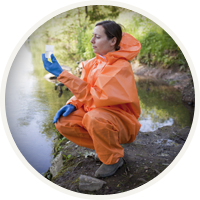
A geoscientist can best be described as a watchdog of the Earth. They delve deep—literally—to study the planet's composition, structure, natural resources, and forces (like the ones that cause earthquakes and volcanic eruptions). Although some positions require working in an office, an important part of this job is planning and conducting field studies, which typically happen in exotic, remote locations. Geoscientists also analyze aerial photographs and rock formations to help gas and oil companies figure out where natural resources may be located. In some states, you'll need to pass a special licensing exam to work as a geoscientist, and if you're interested in a job as a researcher or college professor, you'll want to pursue a PhD. One of the coolest things about working as a geoscientist is getting to mix the past and the future: Not only will you be studying the Earth's history in the form of fossils, rock formations, and other fascinating clues, you'll also be using this knowledge to improve life for the next generation.
The Details
Doctor of Philosophy (PhD)
Career Video
If you are interested in Geoscientist check out this informational video provided by Careeronestop.org
Watch the VideoAlong with protecting people from the effects of impending natural disasters, geoscientists help locate very necessary natural resources such as water and petroleum.
Geoscientists work in areas that experience frequent earthquakes to help determine the safest places to construct bridges and buildings.






